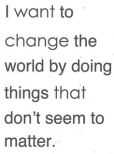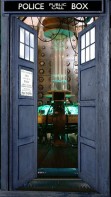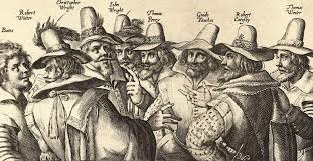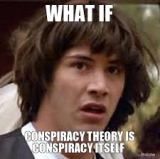Me, Myself and Aye
Some people are anxious about using the apostrophe. Should they leave it out or would that be worse than putting it in the wrong place? I’ve seen an apostrophe floating vaguely above a sentence without committing the sin of landing on the wrong spot.
Same goes for ‘myself’.
Lately I’ve been hearing this one a lot: “He gave the gift to myself.”
Are such speakers confused about whether to use ‘I’ or ‘me,’ fearing embarrassment if they use the wrong one? Do they fear trolls appearing to attack them and so they push ‘myself’ out there as a sort of neutral option?
I seriously doubt that those same speakers would use the word in this way in written form. Apart relying on alarm bells from their innate sense of non-standard English, there’s also the help offered by spellchecker and grammar-checker.
So is there a right and wrong for ‘myself’? Formal English says yes.
‘I’ is the most common version of the first person pronoun: the subject form. Yes, we do like to talk about ourselves.
The object pronoun ‘me’ naturally gets plenty of air time too, as the person on the receiving end, the one being done unto.
So it follows that the reflexive pronoun ‘myself’ should be heard least.
In conventional English, reflexive pronouns are used as a direct and indirect object when the object is the same as the subject of the verb. For example: ‘I congratulated myself when I won’. Here is the direct object of the verb restating the subject. Other examples: ‘He cut himself with the razor’ and ‘She gazed at herself in the mirror’.
Also, adding the preposition ‘by,’ followed by the reflexive pronoun, shows that the person performing the action did so without anyone’s help (e.g. ‘He hung the frames by himself’).
So far, so what? You may congratulate yourself for already knowing this. But do you yourself know it?
The reflexive pronoun is often used for emphasis in conversational English. But traditional grammarians of formal English do not like it. If you really want to give sticklers’ blood pressure a workout, try triple emphasis (e.g. ‘I myself personally believe it to be true’). Ouch.
An old chestnut of grammar lessons is that speakers should never say ‘Between you and I’ when they mean ‘Between you and me.’ It’s the common confusion about object and subject. So the Queen can say ‘My husband and I are happy to be here’ but Her Majesty would be in serious trouble if she went all vernacular and said ‘My husband and me are happy to be here.’
But to confuse the already confused, traditional English grammar also allows ellipsis to reduce word redundancy (e.g. ‘You’re a better man than I, Gunga Din’ rather than saying ‘You’re a better man than I am, Gunga Din’. In this example, the ‘am’ is redundant).
All fairly obvious, so why have I been hearing instances of ‘myself’ used more frequently of late, in preference to ‘I’ or ‘me’? Perhaps I have only just tuned in or perhaps this is a sign of a more relaxed English usage.
So I offer an alternative to the theory of grammar anxiety: blissful ignorance. This is a state much to be desired by those of us who notice the difference and bother about it too much.
Sure, we might have the knowledge of convention, custom and practice, meaning that we can take the linguistic moral high ground but maybe the ignorant legions of ‘myself’ users are happier. Maybe they don’t give a toss. They’re far more interested in life’s bigger concerns. They will probably live longer.
As a word worrier, I myself almost envy them.
Not the end of the world as we know it
Research published in the USA last month showed that, contrary to expectation, the young are reading more than their parents. As the four wise men of The Who said a generation ago, the kids are all right.
Surveys results from a 2013 project conducted by Pew Research Center, funded by the Bill and Melinda Gates Foundation, indicate that so-called ‘Millennials’ (defined as those born between 1985 and 1998), also known as ‘Generation Y’ and the ‘iPhone generation,’ are reading as much as, and in some cases more than, their parents. They read in various formats: e-books, paper books, newspapers, magazines and, of course, on-line. But wait, there’s more. Younger readers are also heavy users of public lending libraries. What the font? This wasn’t supposed to happen. Didn’t we convince ourselves that technology would fracture our attention span, reduce human ability to read any text longer than a limerick, and usher in the decline and fall of literacy?
I’m father to a pigeon pair of Millennials, both keen readers in multiple formats. Whether we should thank J K Rowling or our own example as parents seems less important than taking the opportunity to celebrate these latest research findings. Sure, there’s ignorance among younger readers about history and politics of bygone eras, but wasn’t it ever thus? What group of humans hasn’t complained about inter-generational ignorance? I’m sure Babylonians, Phoenicians and Etruscans whinged about ‘kids today’. But if this recent research is reliable, the signs do not point to Dumb and Dumber as we all feared.
At age seven, my son wrote this line: ‘When you read, you will learn the secrets’. I didn’t keep his proto-essay but I’ve not forgotten that knock-out opening. Written words open a door to secrets. Nowadays we have many doors and it appears that the young are opening them. Since the late Twentieth Century in so-called ‘developed’ countries, we’ve devalued the currency of oral storytelling, instead trusting to the written record or the camera. This loss of transmission for generational sagas and family lore means diminishing cultural richness: a truism newly arrived immigrants and refugees learn as soon as their children start school and embrace their adopted culture. Perhaps over-reliance on documentary record-keeping has a deleterious effect on memory too. Who needs to remember stuff? Isn’t there an app for that? Just recalling where we left the car keys can feel like an achievement.
In my pre-digital childhood, certain books were held sacred: religious texts, scholarly texts and wise narratives. Such volumes acted like a TARDIS, slipping the surly bonds of time and space. Nowadays ‘book’ is a state of mind rather than an object. No wonder Doctor Who and his flying box are enjoying a new lease of life. Every access point to the Internet tells us it’s bigger on the inside. The concept of ‘library’ has reached out and engulfed our world. Reading hasn’t gone away, just diversified.
That polymath of the Renaissance, Sir Francis Bacon, was the last person to brag he had read all the books in the world. No one today–with the possible exception of Kim Jong-un–would make such a claim, not with half a million books published annually. And just imagine trying to read the entirety of one popular website: Wikipedia, a knowledge repository which publishes four million articles every year. If printed, its 1,600 volumes would fill nine stacks of shelving, with a word count fifty times that of Britannica. Compare that to the most recent print edition of the OED, a skimpy twenty volumes. So much text, so little time.
Nicholas Carr, in his 2010 book The Shallows: How the Internet Is Changing the Way We Think, Read and Remember claimed that digital distraction is shrinking our concentration powers to goldfish level. Bill Keller, writing in the New York Times in 2011, alleged ‘we are outsourcing our brains to the cloud’. I feel more sanguine than either author, with their fears of brain-eating computers. So what if Millennials use the global mind for their data-gathering and storage, preferring to concentrate on narrative and analysis? The great Albert Einstein didn’t bother to learn his own phone number. Why waste the time and effort when he could just look it up? Today he’d use a search engine, probably on his phone. The big E made room for big ideas.
So I’m heartened by this recent research, which suggests that the prophets of doom might have spoken prematurely. Dewey did not defeat Truman, after all. Hold the panic presses. Shhh. The kids are reading.
Gunpowder, treason and the plot thickens
Remember, remember, the fifth of November, Gunpowder treason and plot;
I know of no reason why Gunpowder treason should ever be forgot…!
Are we remembering this event for the best reasons? Further lines to that famous verse tell of Guy Fawkes, his thwarted scheme to blow up the king and parliament with barrels of gunpowder, and prevention by divine providence. The verse usually accompanies bonfires—a noisy treat for proto-arsonists young and old.
Guy Fawkes Night was still celebrated in Australia when I was a boy, a post-colonial legacy already going out of style for health and safety reasons. I’ve seen the ceremonies celebrated in England: crowded and crazy, a pyrotechnic Thanksgiving without the turkey. Nor is Guy Fawkes always the villain. For some he’s become an anti-hero, partly thanks to V for Vendetta. And it’s not hard to see why, in the aftermath of 911, a re-born Fawkes would play into the hands of conspiracy theorists.
Most revellers assume they’re celebrating a failed Catholic attempt to assassinate James I on 5th November 1605. That effigy or ‘guy’ atop the bonfire is supposed to be wicked ringleader Fawkes. But folk memory and rhyme sometimes get it wrong. Undoubtedly caught red-handed with the gunpowder, Mr Fawkes was no more a criminal mastermind than Lee Harvey Oswald. At least historians can agree there was an actual conspiracy—ah, but which conspiracy?
5th November would’ve been England’s 911, if it had worked. Blowing up the House of Lords was only part of the plan. Various malcontents were disillusioned with their new king, James VI of Scotland, now James I of the UK, for not going soft on Catholics as they had hoped: quite the reverse. As several attempts against the king’s life had failed, these fellows decided to do the job themselves. Led by Robert Catesby, they would cleanse the realm of king, lords, judges and bishops in one extremely fell swoop, and then stir up a popular revolt.
But they were hardly Al Qaeda. Their weakest link was the size of their inner circle: too large. At the eleventh hour, one conspirator wrote to a sympathetic MP, suggesting he should call in sick to work if he wanted to live, ‘cos His Maj wouldn’t. As this baron remained loyal to the king, the conspiracy was foiled… or was it?
Some historians have cast doubt on the official tale, suggesting a ‘false flag op’ for 5th November. The ‘false flag’ is CIA-style talk for a covert operation, including terror activities, designed to throw the blame on somebody else. The ‘false flag’ here would be the king’s first minister, Robert Cecil, Lord Salisbury, who allegedly engineered the Gunpowder Plot to inspire anti-Catholic sentiment and so strengthen the new king’s reign. The conspiracy notion goes something like this: a perception existed that the king (son of Mary Queen of Scots, a Catholic martyr) was already showing too much leniency with recusants in Protestant England. And little Lord Salisbury feared that English Catholics might become a political handful if treated with moderation. As the king was known to fear violent death due to a boyhood spent in peril of kidnapping, Catholic assassins made the perfect bogeyman. Nice theory but is there any proof?
Some unanswered questions lend credence to this other gunpowder plot. The government held a monopoly on the explosive, securing it in places like the Tower of London, so how did Catesby’s men obtain three-score barrels without attracting attention? Either they had someone on the inside or they relied on the black market. Either way, it’s strange how they could rent a house so close to parliament and then move the barrels from that home to the cellar of parliament without anybody noticing. Troubling questions remain. No half-dug tunnel under parliament has ever been found. Why was there a nine-day delay between the anonymous letter and the search that captured Fawkes? And why, when they knew the plot was blown, did these conspirators not flee the country?
It’s not hard to see the attraction for conspiracy theorists in ‘false flag’ operations, such as the alleged Tonkin Gulf attribution, the JFK assassination and, of course, 911. Records from 1605 do chronicle post-911 types of public outrage, minus the assistance of Fox News and CNN. Catholics were persecuted and murdered. Others saw their homes torched and a succession of laws passed restricting their rights and liberties. England became obsessed with ‘homeland security’. Maybe even more so. Catholic persecution in the early seventeenth century reached levels worse than that of Muslims in the early twenty-first. Is this a lesson worth learning?
Whichever conspiracy is true, the result was terror. We can remember, remember Guy Fawkes as a near miss (strictly speaking, a near hit) or a reflection of the espionage-dense paranoid nature of Elizabethan/ Jacobean society. Remember, remember: only a generation later the country descended into civil war and ultimately regicide.
‘False flag’ operations offer a perpetrator immediate excuses for war. Citizens will be less likely to object if they’re still recovering from acts of terror. War with Spain did follow soon after the foiled 1605 plot, so is it a coincidence that influential English businessmen, including Salisbury, had long been keen for Spanish war, from which they hoped to make a tidy profit? Not exactly War for Oil but it’s hardly a stretch for conspiracy theorists to paint Salisbury as the Dick Cheney of his day.
5th November might have dodged a huge bullet for the United Kingdom but the jury is still out on the ‘remember, remember’ part. And why.








